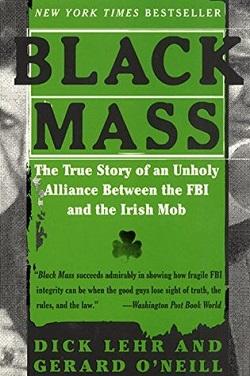Summary

Black Mass
by Dick Lehr
When the FBI turned an Irish mobster into an informant, they corrupted the entire judicial system and sanctioned the worst crime spree Boston has ever seen. This is the true story behind the major motion picture.
James "Whitey" Bulger became one of the most ruthless gangsters in US history, and all because of an unholy deal he made with a childhood friend. John Connolly a rising star in the Boston FBI office, offered Bulger protection in return for helping the Feds eliminate Boston's Italian mafia. But no one offered Boston protection from Whitey Bulger, who, in a blizzard of gangland killings, took over the city's drug trade. Whitey's deal with Connolly's FBI spiraled out of control to become the biggest informant scandal in FBI history.
Black Mass is a New York Times and Boston Globe bestseller, written by two former reporters who were on the case from the beginning. It is an epic story of violence, double-cross, and corruption at the center of which are the black hearts of two old friends whose lives unfolded in the darkness of permanent midnight.
.
Read
Black Mass on http://kissnovel.net
Martial Peak Reviews
Black Mass by Dick Lehr and Gerard O'Neill is a gripping exploration of the dark underbelly of organized crime in Boston, centered around the infamous figure of James "Whitey" Bulger. This true crime narrative delves deep into the complexities of loyalty, betrayal, and the moral ambiguities that arise when law enforcement and criminal enterprises intersect. The authors, both former reporters who covered the case extensively, provide a meticulous account that is both engaging and unsettling, making it a compelling read for anyone interested in the darker aspects of human nature and the failures of the justice system.
The book opens with a vivid portrayal of Bulger's rise to power, illustrating how a childhood friendship with FBI agent John Connolly evolved into a corrupt alliance that would have devastating consequences for Boston. The authors expertly weave together the personal histories of Bulger and Connolly, showcasing how their shared past laid the groundwork for a partnership that would ultimately spiral into chaos. This dual character development is one of the book's strongest elements; Lehr and O'Neill do not merely present Bulger as a one-dimensional villain but rather as a complex figure shaped by his environment and choices. Similarly, Connolly is depicted as a tragic character, whose ambition and desire for acceptance led him to compromise his integrity and the safety of the very city he was sworn to protect.
One of the central themes of Black Mass is the concept of corruption—not just within the criminal underworld, but also within the institutions meant to uphold justice. The authors illustrate how the FBI's reliance on informants can lead to a dangerous game of manipulation and moral compromise. Connolly's decision to protect Bulger in exchange for information about rival gangs is a prime example of this corruption, as it ultimately allowed Bulger to operate with impunity, resulting in a crime spree that left a trail of violence and destruction in its wake. The narrative raises important questions about the ethics of law enforcement practices and the consequences of prioritizing results over integrity.
The book's pacing is another noteworthy aspect; it moves swiftly through the events leading up to Bulger's eventual capture, maintaining a sense of urgency that keeps readers engaged. Lehr and O'Neill employ a journalistic style that is both accessible and informative, making complex legal and criminal concepts understandable to a broad audience. The inclusion of firsthand accounts, court documents, and interviews adds depth to the narrative, allowing readers to grasp the full scope of the scandal and its implications for the Boston community.
Moreover, the authors do not shy away from depicting the brutal realities of Bulger's reign. The graphic descriptions of violence serve to underscore the stakes involved in the criminal underworld, while also highlighting the human cost of Bulger's actions. The impact of his crimes on the lives of ordinary citizens is poignantly illustrated, reminding readers that behind the headlines and sensationalism are real people affected by the chaos of gangland warfare.
In comparing Black Mass to other works in the true crime genre, it stands out for its focus on the interplay between law enforcement and organized crime. While books like Wiseguy by Nicholas Pileggi and Donnie Brasco by Joseph D. Pistone also explore the lives of mobsters, Lehr and O'Neill's narrative is unique in its examination of the systemic failures that allowed Bulger to thrive. The authors effectively highlight how the very institutions designed to combat crime can become complicit in it, a theme that resonates with contemporary discussions about accountability and ethics in law enforcement.
The impact of Black Mass extends beyond its pages; it serves as a cautionary tale about the dangers of unchecked power and the moral compromises that can arise in the pursuit of justice. The book's revelations about the FBI's relationship with Bulger have sparked ongoing debates about the integrity of law enforcement agencies and the need for reform. In an era where trust in public institutions is increasingly scrutinized, Lehr and O'Neill's work is both timely and relevant.
In conclusion, Black Mass is a masterfully crafted narrative that offers a chilling glimpse into the world of organized crime and the corruption that can fester within the institutions meant to combat it. Dick Lehr and Gerard O'Neill have produced a compelling account that is not only informative but also deeply thought-provoking. Their exploration of the complexities of loyalty, betrayal, and moral ambiguity resonates long after the final page is turned. For those interested in true crime, law enforcement, or the intricate dynamics of power, Black Mass is an essential read that will leave a lasting impression.




![[VS]](/upload/pic/manga/-vs-.jpg)


















Reviews 0
Post a Reviews: